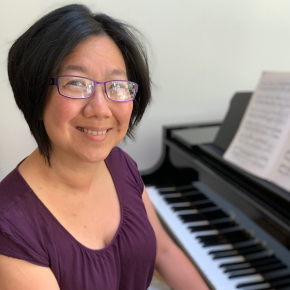HEART.FM, at the heart of music therapy: Elaine Chew's ERC Proof of Concept grant
Music may soften hearts but it also has positive effects on cardiovascular health. The HEART.FM project has received an ERC Proof of Concept grant to work on the development of an application capable of personalising music therapy according to patients' physiological signals. The pianist and mathematician Elaine Chew is the 'conductor' of the team working on this project which is based at the Science and Technology of Music and Sound Laboratory (STMS — CNRS/Institute for Research and Coordination in Acoustics & Music/Culture and Communication Ministry/Sorbonne University).
Everyone loves music and considers it to have countless virtues. It is relaxing, makes you want to dance or cry, etc. However its true impact is hard to quantify. Elaine Chew, a researcher at the Science and Technology of Music and Sound Laboratory (STMS, CNRS/Sorbonne University/IRCAM/Culture Ministry), works on measuring how music influences physiological criteria like blood pressure and the pulse rate. With her team she was awarded an ERC Proof of Concept grant for HEART.FM.
Cosmos1 , her first ERC project, delivered mathematical models of the impact of music and instrumental interpretations on the human body. "Analysis of music tends to focus too often on study of musical scores," complains Elaine Chew. "We prefer to observe how music is played and perceived because that is how people come into contact with it the most often." This is a central theme in the ideas of the researcher, herself a top-level pianist who has composed 'études' based on cardiac arrhythmia.
Synchronised analysis of musical structures and intracardiac electrocardiograms has revealed that music has an impact on cardiac electrophysiology. HEART.FM intends to take this work further to study blood pressure using a music therapy application capable of adapting to patients according to their biological signals. "Music affects the autonomic nervous system which regulates pulse and blood pressure," explains Elaine Chew. "Even short excerpts can stabilise a patient's vital signs and improve some cardiac symptoms in the short term. Music therapy uses these beneficial effects and takes them further." Music also acts on blood circulation in the brain and can reduce stress and anxiety.


HEART.FM particularly focuses on the issue of blood pressure which is a key factor in the body's balance. Blood pressure measurement is one of the most common diagnostic tools. Patients with high blood pressure benefit from even a small blood pressure improvement which is enough to reduce the risk of cardiovascular disease and, more generally, all-cause mortality. However, the customisation of music therapy by a professional takes a lot of time and resources which is why HEART.FM's aim is to automate part of the process.
The team will explore the use of different handheld devices with the help of Pier Lambiase from University College London and Barts Heart Centre and Philippe Petit from CNRS Innovation. The aim of this research is for everyone to be able to use the application on their own. In the future, parameters which reflect electrical cardiac or respiratory activity other than blood pressure could also be taken into account to help adapt the songs and pieces played to individuals. However, it is not enough to refer to a questionnaire on people's tastes to optimise therapy because physiological signals provide much more reliable answers for scientists and doctors.
HEART.FM will use lightweight sensors like sports watches, bracelets and belts, many of which are already available on the market. The researchers will need to find the right balance between accuracy, efficiency, cost and portability. The data could also be reused for cohort studies on these treatments. This ERC Proof of Concept grant therefore provides an opportunity to bring and promote personalised music therapy.

EHRA2020: Cardiac Response to Live Music Performance: Effect of large-scale musical structure ...
Audiodescription
Contact
Notes
- Computational shaping and modelling of musical structures
